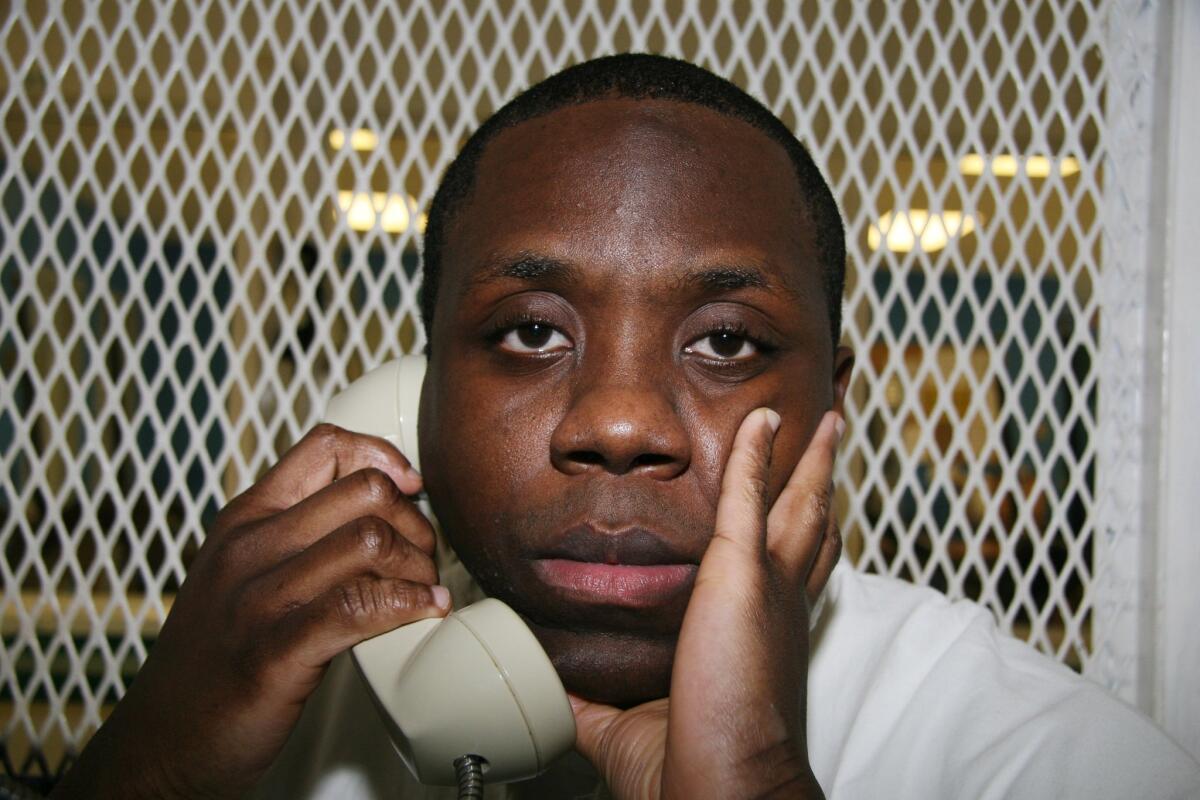Texas man who set fire that killed his 18-month-old daughter executed

Condemned Texas inmate Raphael Holiday is seen during an interview last month at the Texas Department of Criminal Justice Polunsky Unit near Livingston, Texas.
- Share via
Reporting from HOUSTON — Texas authorities put to death Wednesday night an inmate who had claimed that his court-appointed attorneys had given up on the case by refusing to mount last-ditch efforts to save his life.
Raphael Holiday’s two federally appointed attorneys say they did the best they could during the last four years, that they were wary of giving the condemned man false hope and that it was another attorney, Gretchen Sween, who ultimately refused to help them.
“Would most of your readers want a dreamy-eyed lawyer who offers false hope, or a lawyer who is realistic and objective?” James Volberding, one of Holiday’s attorneys, asked The Times.
On Wednesday afternoon, Holiday’s original trial attorney filed a motion for a stay of execution. The Texas attorney general’s office, however, successfully appealed and Holiday was put to death Wednesday evening by lethal injection.
Holiday, 36, was sentenced to die in 2002 for setting a fire in rural Madison County that killed his 18-month-old daughter and her two half-sisters, ages 5 and 7.
At trial, prosecutors presented evidence that Holiday’s former common-law wife had obtained a protective order against him after he was arrested for assaulting one of the girls. Testimony indicated he forced the children’s grandmother at gunpoint to douse the inside of their log cabin with gasoline, which ignited.
By law, attorneys appointed to represent death row clients shall represent them in “all available post-conviction proceedings.” Volberding said he tried to represent Holiday, to find new evidence for additional appeals, but didn’t want to give him false hope.
The court-appointed lawyers filed a 286-page petition in federal court alleging dozens of mistakes in the case and questioning the validity of the state’s clemency process.
In June, the Supreme Court refused to review the case, and Holiday’s attorneys told him they would not file additional appeals or seek clemency from the governor because neither would likely save his life. They said he should try to find another attorney to help him.
Kathryn Kase, executive director of the nonprofit Texas Defender Service, which trains and assists lawyers who represent death row inmates, said Holiday’s case in worrisome.
“I’m troubled about any lawyer who represents a client in a death penalty case who tells a client there’s no hope here,” she said.
After his attorneys balked, Holiday failed to find a new lawyer and wrote to the court for help.
“I beg you to consider new appointment of effective counsels to my case,” he wrote. “They have refused to help me.”
Seth Kretzner, the other lawyer representing Holiday, responded with a letter to the court insisting that he was still working the case and had refused to pursue clemency because of Texas’ “political realities.”
In October, Sween, of Austin, agreed to help Holiday. An appellate lawyer who teaches at the University of Texas School of Law, Sween filed a motion alleging that Holiday’s attorneys had abandoned him when he needed them most and requested that the court replace them.
Holiday’s attorneys first threatened to seek sanctions against Sween, and then they asked for her help. She declined, insisting that she was unqualified because she had never represented a death row inmate on appeal.
Holiday’s attorneys filed his clemency petition a few days before the deadline, which Sween alleges was a “cut and paste job” that amounted to “a knife in the back of their client.”
“They threw something together,” she said.
Volberding disagrees, saying the clemency petition was “thorough.”
Volberding said he has not been able to correspond with or even visit Holiday since October, when the inmate turned him away. He blames Sween for destroying their relationship.
“The real issue is what right does another lawyer have to jump into the case who states herself she is unqualified and refuses to take the cases when we offer it?” Volberding said. “We give reasonable hope, but not false hope. That’s what I believe Ms. Sween has done, is give false hope to this inmate. I believe that’s cruel. Lawyers have a duty to be truthful to clients and to courts.”
Sween appealed to the 5th Circuit, noting that Holiday was in conflict with his attorneys and asking the judges to stay his execution. A three-judge appellate panel denied the request, and Sween appealed to the Supreme Court.
He was the 13th prisoner executed in Texas this year.
ALSO
How the U.S. plans to stop the next Edward Snowden
Heartbroken man spends more than $700,000 on psychics, chasing after lover
‘We do want justice,’ says sister of unarmed black man killed by Minneapolis police
More to Read
Sign up for Essential California
The most important California stories and recommendations in your inbox every morning.
You may occasionally receive promotional content from the Los Angeles Times.








